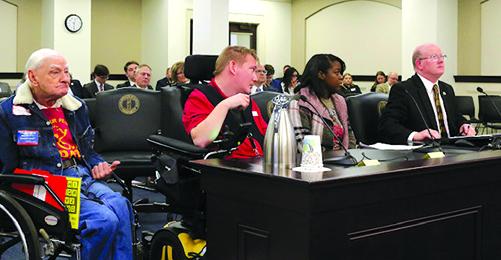Frank Huffman joins Mark Hart before committee
By Carolyn Reid
FRANKFORT — Frank Huffman is an advocate for other-abled people. He is as tenacious as he is outspoken when it comes to the rights of those who have limited freedoms due to their disabilities.
The 2014 Pendleton County High School graduate from DeMossville knows well. He has lived in a body that does not cooperate all his life. But his mind is a different story.
The House Standing Committee on State Government learned that last week as Huffman joined Rep. Mark Hart, R-Falmouth, to argue for House Bill 214.
Huffman and Hart were joined by Arthur Campbell Jr., a disability activist and civil rights worker from Louisville who, in spite of a severe speech impairment requiring an interpreter, has worked for 40 years in the field of advocacy and activism, and he plans to dedicate “the rest of (his) life to this work of empowering (his) brothers and sisters with both mentally and physically disabilities.”
Campbell referred to the Bill of Rights for Persons with Developmental Disabilities that was passed in 1986. This act established the rights of a person with a developmental disability to have a residence that is the least restrictive and individually appropriate, to be able to interact with others who are non-disabled, and to establish the least restrictive services in order to develop daily living skills, among other rights.
He stated HB214, also known as the Frank Huffman Act, “would enhance and expand” the current bill.
When he appeared in front of the committee, Huffman simply and clearly stated his wishes:
“This bill is important to me right now because the law says if I want to get a job in the community, have a relationship or even a friend, a lot of people have to ask their guardians. As individuals, we have the right to make those decisions.”
Huffman said he considers himself lucky, as he shared in a recent Facebook post regarding the legislation:
“It will be good to have a bill of rights because the ADA is great, but doesn’t cover a lot of needs for people with disabilities. I am very fortunate that I am my own guardian, but a lot of people I know with disabilities aren’t. This bill would help protect people like me have the right to work in the community, and to promote relationships and trust with friends and a list of other rights, even though their family may disagree with those rights!”
The bill contains language that may be surprising to the average person, but it demonstrates the struggles people with disabilities face.
The text includes language that guarantees people with disabilities will be treated with courtesy and respect; individuals will be accommodated as needed, but will still have privacy and independence; they will be allowed to practice the religion of their choice or abstain from practices; they will be treated equally as citizens under the law; they can pursue jobs that will aid them in economic independence; they will be treated equally as citizens under the law, and will be protected from emotional, psychological, verbal, and physical abuse; they will make their own decisions as much as they are capable of doing so; they will be able to manage their own personal affairs, and they will also manage their health concerns confidentially except for where such release is allowed by law, and they are free from medical experimentation when they refuse it; they may participate in the political process; and they will be able to participate in educational and vocational processes with full integration, among other basic rights.
Huffman, formerly part of the Kentucky Protection and Advocacy for Persons with Developmental Disabilities Board, or PADD, has worked with Hart to get this bill through for six years, according to advocates who work with the Kentucky Protection & Advocacy Office.
They shared that other committees questioned language in the bill or other elements of the bill previously, leaving them to work on the presentation.
This year, the committee unanimously approved the bill, and the chair of the committee assured Huffman, Campbell, and Hart that the bill was likely set to be approved by the legislature.
Huffman commended Hart for his work on the bill.
While the Committee on State Government approved the forward movement of the bill last Wednesday, another bill was being introduced elsewhere in Frankfort by the Senate, and that has Huffman’s attention. Senate Bill 173 caused Huffman to post, “….this measure grossly oversteps boundaries of privacy and trust.”
The bill would allow caregivers to “install, or cause to be installed, video recording devices in the private residential room of the individual receiving services,” i.e. the bedrooms of those individuals.
While the bill stems from a desire to protect those with disabilities, Huffman declares, “We are adults, not children!”
Huffman calls for action against this bill, asking people to contact their legislators to speak against it. He says he also plans, along with his mom and an advocate from Protection and Advocacy, to go in front of the senate to testify against the bill.


